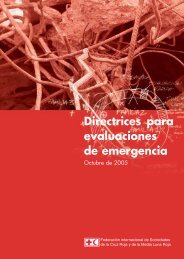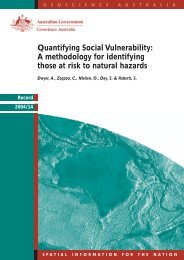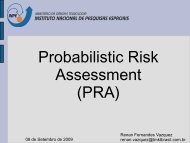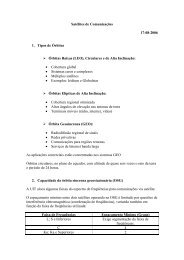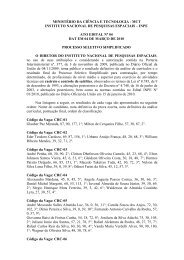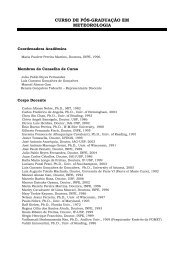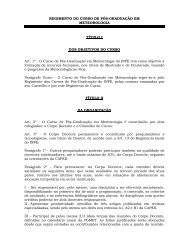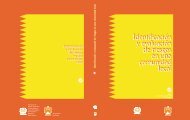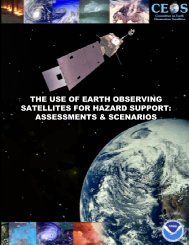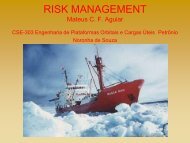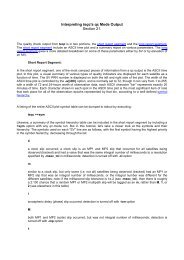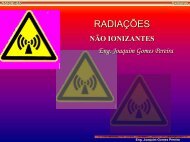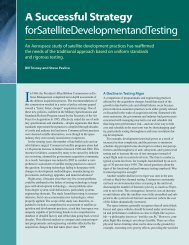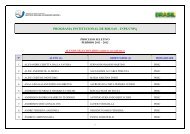Living with Risk. A global review of disaster reduction initiatives
Living with Risk. A global review of disaster reduction initiatives
Living with Risk. A global review of disaster reduction initiatives
You also want an ePaper? Increase the reach of your titles
YUMPU automatically turns print PDFs into web optimized ePapers that Google loves.
4<br />
<strong>Living</strong> <strong>with</strong> <strong>Risk</strong>: A <strong>global</strong> <strong>review</strong> <strong>of</strong> <strong>disaster</strong> <strong>reduction</strong> <strong>initiatives</strong><br />
its interest revolves around remotely sensed<br />
data, GIS applications, mapping and display<br />
information, GDIN also tries to assist <strong>disaster</strong><br />
specialists in obtaining information that may<br />
otherwise be difficult for them to locate or to<br />
access through individual efforts. It particularly<br />
strives to benefit <strong>disaster</strong> managers in areas<br />
where there are limited resources or limited<br />
access to technology. Further elaboration about<br />
GDIN activities and intentions can be<br />
obtained at www.gdin.org.<br />
Using cyberspace to discuss<br />
<strong>disaster</strong> risk <strong>reduction</strong><br />
At a more individual level <strong>of</strong> information<br />
exchange, there is an increasing number <strong>of</strong><br />
publicly accessible and free multidisciplinary e-<br />
mail discussion groups, listserves and related<br />
electronic networks that can be accessed.<br />
An NGO network, The Stakeholder Forum<br />
for Our Common Future, and the ISDR Secretariat<br />
organized an online discussion during<br />
May 2002, on the subject, "Links between natural<br />
hazards, environment and sustainable<br />
development: Taking action to reduce the risk<br />
<strong>of</strong> <strong>disaster</strong>s". An effort was made to broaden<br />
the discussion <strong>of</strong> these related topics to a much<br />
larger group <strong>of</strong> interested people than those<br />
who may otherwise be involved <strong>with</strong> matters <strong>of</strong><br />
sustainable development. More than 350 participants<br />
from 80 countries registered and<br />
many engaged in an active exchange <strong>of</strong> views,<br />
experience and concerns. These were all posted<br />
on a dedicated website which can be viewed at<br />
www.earthsummit2002.org/debate. Numerous<br />
topics emerged, including: the impact <strong>of</strong> natural<br />
hazards on development and how to reverse<br />
vulnerability; risk assessment and early warning<br />
systems; fostering community involvement<br />
and developing coping capabilities <strong>with</strong>in communities;<br />
and the promotion <strong>of</strong> education and<br />
capacity building. A wealth <strong>of</strong> experience<br />
unfolded during the month, as case examples<br />
illustrated a variety <strong>of</strong> specialist knowledge.<br />
There were also carefully considered comments<br />
about current limitations, and the imagined<br />
roles and responsibilities that may lead to<br />
potential solutions. Some <strong>of</strong> these outlooks are<br />
included in this <strong>global</strong> <strong>review</strong>. Regardless <strong>of</strong><br />
the individual views expressed, a readily per-<br />
ceived value <strong>of</strong> such exchanges is the ease <strong>of</strong><br />
being in touch <strong>with</strong> other people around the<br />
world who share a pr<strong>of</strong>essional interest and<br />
personal commitment to these issues. It is an<br />
excellent form <strong>of</strong> networking, that is stimulating<br />
too. It is easy, and does not require a large<br />
investment - beyond ones' own time and wish<br />
to contribute.<br />
A similar discussion was and cyber conference<br />
was organized in Novermber 2001 <strong>with</strong> the<br />
Division for the Advancement <strong>of</strong> Women<br />
(UN/DESA), on <strong>disaster</strong> <strong>reduction</strong> and natural<br />
resource management <strong>with</strong> a geneder perspective,<br />
see: www.un.org/womenwatch/daw<br />
One such initiative is the natural-hazards-<strong>disaster</strong>s<br />
network that is a managed information<br />
service and discussion group that covers socioeconomic,<br />
psychological, organizational, scientific<br />
and technical aspects <strong>of</strong> <strong>disaster</strong> triggered<br />
by all kinds <strong>of</strong> natural and technological hazards.<br />
Its members are drawn from operational<br />
agencies and academic institutions throughout<br />
the world and anyone <strong>with</strong> an interest in the<br />
subject can join through the list's web site at<br />
www.jiscmail.ac.uk/lists/natural-hazards-<strong>disaster</strong>s.<br />
Another similar and lively source <strong>of</strong> information,<br />
discussion and pr<strong>of</strong>essional debate<br />
regarding the social dimensions <strong>of</strong> hazards,<br />
vulnerability and risk particularly following a<br />
major <strong>disaster</strong>, is the Radical Interpretation <strong>of</strong><br />
Disaster Experience (RADIX) web site, located<br />
at www.apu.ac.uk/geography/radix, which was<br />
initiated by the scholar Ben Wisner . IRADIX<br />
seeks to provide a venue for discussion, working<br />
papers, opinion pieces, resources, or links<br />
that can help in understanding the root causes<br />
<strong>of</strong> <strong>disaster</strong>s. This includes issues such as<br />
human rights, respect for diversity, translation<br />
<strong>of</strong> available knowledge into action, links<br />
between <strong>disaster</strong>s, economic development and<br />
politics, <strong>with</strong> particular relevance to local community<br />
interests and people-centred activities<br />
for risk <strong>reduction</strong>. RADIX seeks to bring<br />
together groups related to <strong>disaster</strong> risk <strong>reduction</strong><br />
that have not always shared information<br />
easily <strong>with</strong> one another, including scientists,<br />
human rights activists, development workers,<br />
government <strong>of</strong>ficials, business executives, environmentalists,<br />
media representatives, etc.<br />
160



